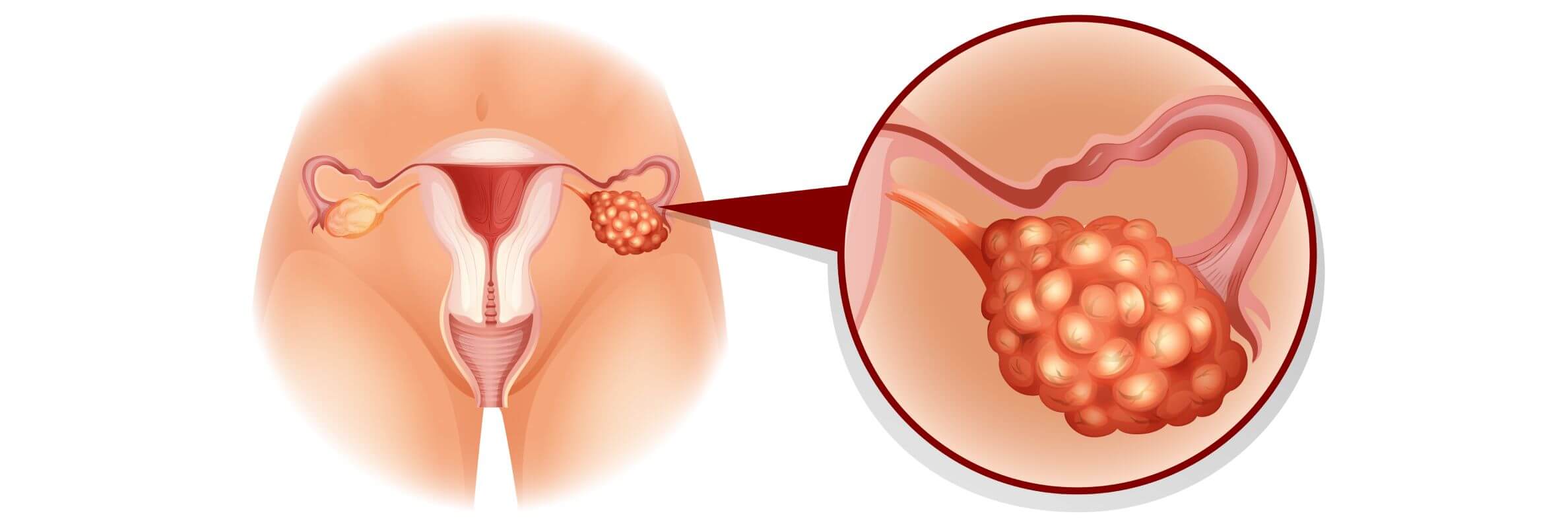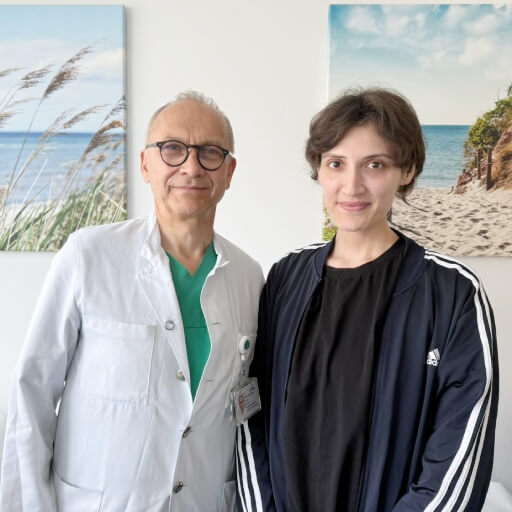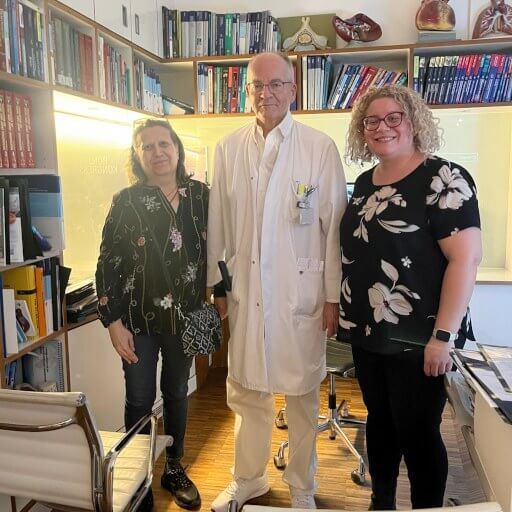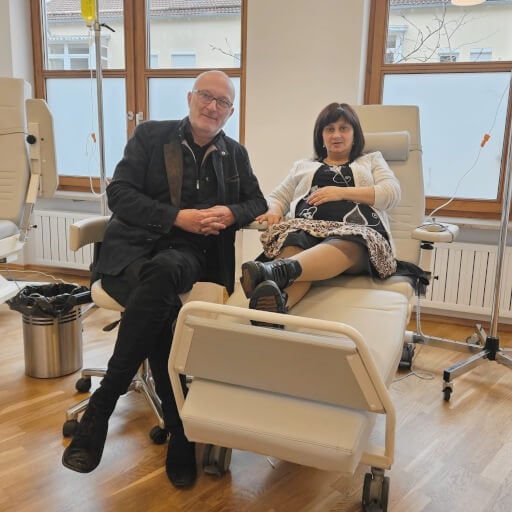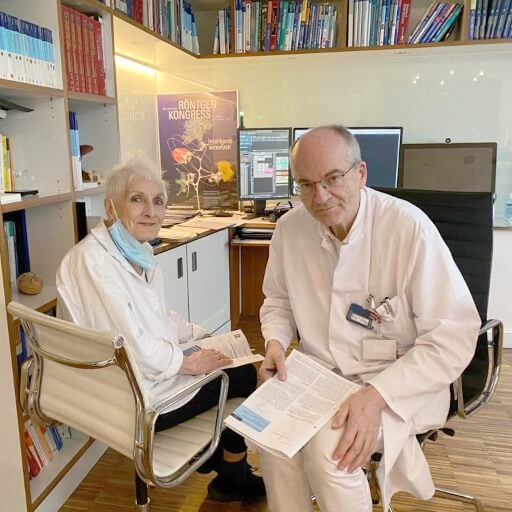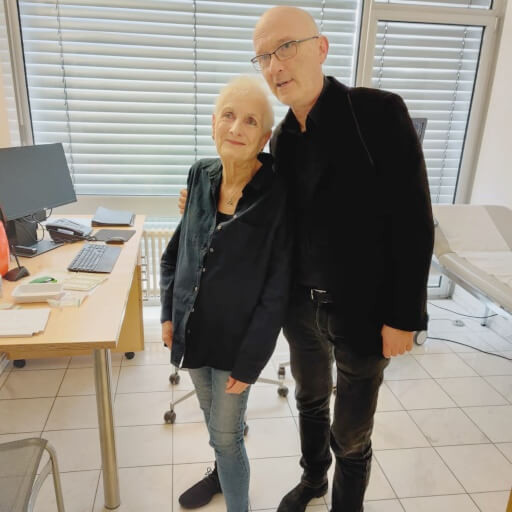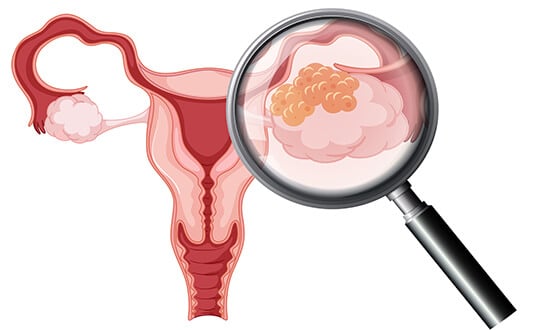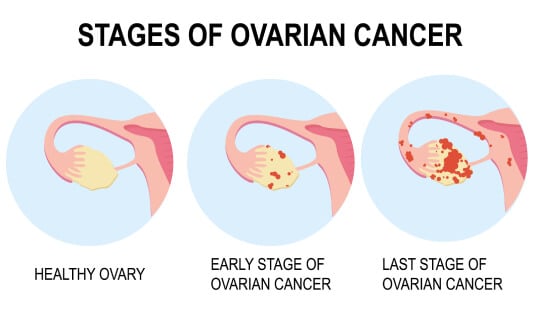Рак яичников является серьезной проблемой мировой системы здравоохранения. Онкопатология занимает 8-е место по распространенности среди злокачественных заболеваний у женщин. В 2022 году во всем мире было зарегистрировано около 324 603 новых случаев заболевания, из которых более 206 000 закончились летальным исходом. [1] Рак яичников во многих случаях протекает без специфической симптоматики, что и является причиной его поздней диагностики. Пятилетняя выживаемость при этом заболевании составляет 36-46%. [2]
В Германии рак яичников остается серьезной проблемой: в 2022 году было зарегистрировано 7 547 новых случаев этого заболевания. [1] Впрочем, из системы здравоохранения государства были выделены денежные средства на внедрение программ ранней диагностики и передовых методов лечения рака яичников, что способствовало повышению показателей относительной 5-летней выживаемости до около 44%. Следует отметить, что при выявлении данного заболевания на первой стадии показатель 5-летней выживаемости достигает 90%. [3]
Германия – это страна, которая славится своим превосходным уровнем медицинского обслуживания, передовым оборудованием в клиниках и четким соблюдением международных протоколов лечения. В этой стране пациентов обслуживают междисциплинарные команды специалистов, которые разрабатывают для них персонализированные схемы лечения, включая в них инновационные виды терапии. Пациентки в поиске комплексного лечения рака яичников в Германии гарантировано получат помощь специалистов с богатым экспертным опытом в области медицины и чуткую поддержку. Именно поэтому эта страна является одним из наиболее популярных направлений медицинского туризма.
Что такое рак яичников?
Рак яичников – это злокачественная опухоль, развивающаяся в яичниках. Данный вид рака часто называют «тихим убийцей» из-за его едва заметных ранних симптомов, которые часто становятся причиной выявления онкопатологии на поздних стадиях. [4]
Типы рака яичников
Рак яичников классифицируется по исходному типу клеток:
- Эпителиальные опухоли возникают из клеток, покрывающих поверхность яичников, и составляют примерно 90% случаев рака яичников. [5, 6] Подтипы эпителиальных опухолей:
- Серозная карцинома высокой степени злокачественности – наиболее распространенная и агрессивная форма заболевания.
- Серозная карцинома низкой степени злокачественности – встречается реже и характеризуется медленными темпами роста.
- Эндометриоидная карцинома – ее возникновение во многих случаях обусловлено эндометриозом.
- Светлоклеточная карцинома – ее развитие связано с эндометриозом, а также этот подтип рака яичников более резистентный к химиотерапии.
- Муцинозная карцинома – встречается довольно редко и обычно диагностируется на ранней стадии.
- Опухоли зародышевых клеток представляют собой редкую группу новообразований, возникающих из клеток, которые вырабатывают яйцеклетки. На их долю приходится всего около 2% всех случаев рака яичников. [6] Такие опухоли преимущественно поражают молодых женщин. Их подтипы включают дисгерминомы и опухоли желточного мешка. [5, 6]
- Опухоли стромы полового тяжа развиваются из соединительной ткани яичников, встречаются редко и часто продуцируют гормоны. Примерами таких новообразований являются гранулезоклеточные опухоли и опухоли из клеток Сертоли-Лейдига. [5-7]
Стадии рака яичников
Рак яичников классифицируется на четыре основных стадии:
- Стадия I – онкопроцесс ограничен одним или обоими яичниками.
- Стадия II – опухоль распространяется на органы малого таза.
- Стадия III – опухоль распространяется на органы брюшной полости или лимфатические узлы.
- Стадия IV – у пациентки присутствуют метастазы в отдаленных органах, например, печени или легких.
Выявление рака яичников на ранних стадиях способствует существенному повышению показателей выживаемости: например, на стадии I пятилетняя выживаемость составляет около 89%, а на стадии II – 71%. Однако в силу того, что рак яичников на ранних стадиях часто протекает бессимптомно, около 75% случаев этого заболевания диагностируются на поздних стадиях: показатели выживаемости на стадии III составляют 40%, а на стадии IV – всего 20%. [6, 8]
К сожалению, в настоящее время не существует надежного скринингового обследования для выявления рака яичников на ранних стадиях. Поэтому крайне важно обращать внимание на такие симптомы, как постоянное вздутие живота, боли в области таза или живота, а также изменения в мочеиспускании.
Почему стоит сделать выбор в пользу лечения рака яичников в Германии?
Отличительной чертой системы здравоохранения Германии являются высокие стандарты медицинского обслуживания, благодаря которым пациенткам гарантируются превосходные возможности лечения рака яичников.
Преимущества лечения рака яичников в Германии:
- Высокие стандарты медицины: немецкие госпитали придерживаются строгих протоколов качества, обладают сертификацией таких организаций, как Немецкое общество онкологии.
- Передовые технологии: клиники оснащены современным оборудованием для проведения диагностики и лечения, включая устройства для проведения ПЭТ/КТ с целью получения точных снимков и системы роботизированной хирургии для выполнения малоинвазивных хирургических процедур.
- Опытные специалисты: в Германии работают лучшие онкологи, а также здесь к услугам пациенток лучшие отделения гинекологической онкологии.
- Доступ к лечению в рамках клинических исследований и инновационным видам терапии: у пациенток есть возможность принять участие в клинических исследованиях, посвященных изучению инновационных методов лечения рака яичников в Германии, например, таргетной терапии и иммунотерапии.
- Персонализированный подход к лечению: в немецких медицинских центрах лечение проводится по индивидуальным схемам, которые разрабатываются на основе данных генетического профилирования опухоли и молекулярной диагностики с целью обеспечения каждой пациентке наилучших результатов.
Таким образом, при выборе в пользу лечения рака яичников в Германии пациентка получает множество преимуществ, предлагаемых системой здравоохранения этого государства. В Германии технологические инновации сочетаются с пациент-ориентированным медицинским обслуживанием, что способствует повышению показателей выживаемости и качества жизни больных, которые приезжают сюда с различных уголков мира.
Стандартные методы лечения в Германии
В Германии применяется передовой подход к лечению рака яичников, предполагающий сочетание стандартных методик с инновационными видами терапии для улучшения результатов лечения. Ниже представлен обзор основных стандартных методов лечения, которые предлагаются в немецких медицинских центрах.
Хирургическое лечение
Хирургия рака яичников в Германии – это главный метод лечения этого онкологического заболевания. Целью операции является максимально возможное удаление опухолевой массы. Немецкие госпитали специализируются на проведении обширных циторедуктивных операций и малоинвазивных процедур – оптимальный для пациентки вариант лечения рака яичников подбирается с учетом стадии онкопроцесса и ее состояния здоровья.
- Циторедуктивная операция – это хирургическое вмешательство, суть которого заключается в удалении максимально возможного объема видимых опухолевых тканей в яичниках, матке, маточных трубах и пораженных окружающих тканях.
- Малоинвазивная операция – чаще всего подобные вмешательства выполняются лапароскопическим доступом, благодаря чему максимально сокращаются сроки восстановления пациентки в послеоперационном периоде и снижается риск развития осложнений.
По данным общенационального анализа, ранее около 85% операций по лечению рака яичников в Германии проводились посредством лапаротомии, но сейчас врачи все чаще делают выбор в пользу лапароскопического доступа, при котором отмечается более низкий уровень внутрибольничной смертности – всего 0,4% по сравнению с 2,9% при выполнении классических открытых операций. [9]
Химиотерапия
Как правило, химиотерапия назначается после выполнения операции с целью уничтожения остаточных раковых клеток. В немецких центрах онкологии применяются передовые схемы химиотерапии, в ходе проведения которых врачам одинаково важно добиться эффективного результата лечения и сохранить удовлетворительное самочувствие пациентки.
Особенности химиотерапии рака яичников в Германии:
- Лечение проводится циклами – благодаря такому подходу обеспечивается достаточный период времени для восстановления здоровых клеток и минимальная токсичность химиотерапии.
- Дозоуплотненные режимы химиотерапии – пациентке вводятся меньшие дозы химиопрепаратов, но с более короткими интервалами между курсами, что в отдельных случаях способствует улучшению результатов лечения.
- Химиотерапия сочетается с инновационными методиками лечения – процедура часто проводится в качестве составляющей гипертермической внутрибрюшинной химиотерапии (HIPEC) в ходе хирургической операции для лучшего локального воздействия на раковые клетки.
Немецкие клиники завоевали международное признание благодаря своему экспертному опыту в области проведения химиотерапии в рамках комплексных пациент-ориентированных схем лечения рака.
Таргетная терапия
Появление таргетной терапии стало новой главой в лечении рака яичников, поскольку этот метод направлен на воздействие на специфические биологические механизмы, способствующие росту и распространению раковых клеток. В отличие от традиционной химиотерапии, при таргетной терапии минимизируется повреждение здоровых тканей, при этом обеспечивается эффективное подавление роста и распространения злокачественной опухоли.
В Германии таргетная терапия является частью передовых схем лечения рака яичников. Во многих случаях эта методика применяется в ходе первичного курса лечения или после него с целью продления периодов ремиссии и повышения показателей выживаемости.
Отличительные особенности таргетной терапии для лечения рака яичников в Германии:
- Высокоточный метод – воздействует на специфические белки или пути, участвующие в росте и выживании раковых клеток.
- Минимальный профиль побочных эффектов – прицельно воздействует на раковые клетки, при этом повреждение нормальных клеток практически исключается.
- Длительная ремиссия – помогает замедлить прогрессирование заболевания после завершения первоначального курса лечения.
- Хорошо сочетается со стандартными методами лечения – часто проводится в комплексе с хирургическим вмешательством или химиотерапией для обеспечения пациентке комплексного лечения.
В немецких госпиталях таргетная терапия применяется в качестве персонализированного метода прецизионной медицины, обеспечивающего пациенткам с раком яичников доступ к новейшим достижениям в области клинической онкологии.
Лучевая терапия
Как правило, лучевая терапия не относится к числу основных методов лечения рака яичников. Облучение применяется в качестве паллиативной терапии для облегчения симптомов, например, болевого синдрома или кровотечений, на поздних стадиях онкологического заболевания.
- Паллиативная лучевая терапия – применяется для облегчения симптомов и улучшения качества жизни пациенток с метастатическим раком яичников.
Достижения в области лучевой терапии, например, внедрение в клиническую практику спиральной томотерапии, способствуют повышению точности лечения при минимизации повреждений окружающих здоровых тканей.
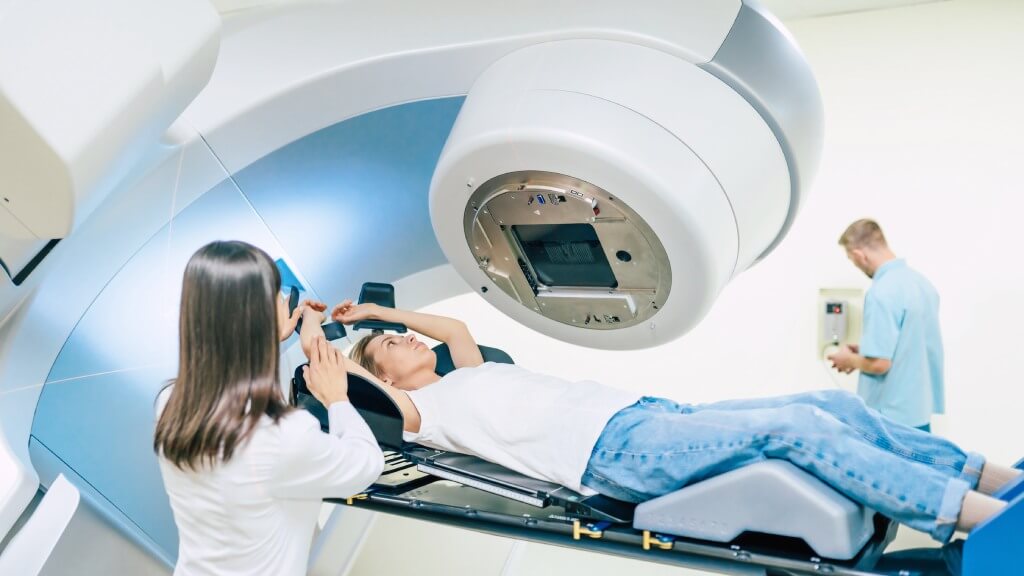
Инновационные и передовые методы лечения
HIPEC (гипертермическая внутрибрюшинная химиотерапия)
HIPEC – это передовой метод лечения, предполагающий введение разогретого до высоких температур раствора химиопрепаратов непосредственно в брюшную полость сразу после выполнения циторедуктивной операции. Данный метод направлен на уничтожение остаточных раковых клеток, что особенно важно для пациенток с раком яичников на поздних стадиях.
В Германии HIPEC выполняется в специализированных медицинских центрах. Процедура демонстрирует многообещающие результаты: согласно результатам одного из исследований, у пациенток, которым была проведена операция по полной резекции опухоли с последующей HIPEC и системной терапией, медиана выживаемости составила 35 месяцев. Впрочем, эффективность процедуры HIPEC может варьироваться, ведь некоторые исследования демонстрируют, что наилучшие результаты она демонстрирует у пациенток с минимальной остаточной болезнью. [10, 11]
Электрохимиотерапия (ЭХТ) при раке яичников
ЭХТ при раке яичников прицельно действует там, где расположена опухоль. Метод использует локальные электрические импульсы для открытия пор в мембранах раковых клеток – когда клетки становятся уязвимыми, химиопрепараты проникают в них в концентрациях, недостижимых при внутривенном введении.
Электрохимиотерапия в гинекологической онкологии проводится следующим образом: электроды размещают вокруг опухоли, компьютер контролирует подачу импульсов (под анестезией), раковые клетки становятся проницаемыми. Высокодозная химиотерапия вводится через артериальные катетеры в ходе изолированной перфузии – поглощение препарата клетками возрастает экспоненциально. Эффективность ЭХТ основана на более высокой чувствительности раковых клеток к электрическим импульсам по сравнению со здоровыми тканями.
После 15-минутной перфузии в условиях гипоксии проходит химиофильтрация для удаления избытка препаратов – побочные эффекты лечения минимальны, пациентки могут перемещаться по клинике в тот же день. Метод особенно эффективен при канцероматозе брюшины, устойчивом к химиопрепаратам.
Информацию о стоимости электрохимиотерапии можно найти на сайте Booking Health. Стоимость может различаться в медицинских учреждениях в зависимости от их географического расположения и профессионального уровня.
Регионарная химиотерапия при раке яичников
Регионарная химиотерапия доставляет концентрированные химиопрепараты непосредственно к опухоли. Для объяснения механизма работы метода профессор Айгнер использует кулинарную аналогию: когда он готовит из тех же ингредиентов, что и его жена, его блюдо получается не таким вкусным – поэтому важно точно знать, как делать это правильно. И он знает, как правильно проводить регионарную химиотерапию, потому что занимается этим почти 45 лет.
Гипоксическая изолированная перфузия брюшной полости включает следующие этапы: баллонные катетеры изолируют кровоток в брюшной полости, после этого болюсно вводятся химиопрепараты. Пятнадцать минут в условиях гипоксии – а затем химиофильтрация удаляет препараты, предотвращая нежелательную системную токсичность.
Регионарная химиотерапия в Германии, в Онкологической клинике Медиас Бургхаузен демонстрирует хорошие результаты: у 107 пациенток медиана выживаемости составила 11,9 месяцев (случаи, резистентные к препаратам), частота ответа на лечение – 69%, качество жизни улучшилось у 74% женщин. Профессор Айгнер провел более 20 000 процедур – никто в мире не имеет такого опыта – он рассказывает о своей работе в интервью.
Иммунотерапия: терапия дендритными клетками
Иммунотерапия дендритными клетками – это персонализированный метод лечения рака яичников, суть которого состоит в следующем: на первом этапе процедуры производится забор собственных дендритных клеток пациентки, после чего они подвергаются воздействию опухоль-специфических антигенов и повторно вводятся онкобольной для стимуляции иммунного ответа против раковых клеток.
Подтверждением важной роли дендритных клеток в иммунотерапии стало присвоение Ральфу Штейнману в 2011 году Нобелевской премии по физиологии и медицине за их открытие. Терапия дендритными клетками продемонстрировала благоприятный профиль безопасности и потенциальную эффективность при ее применении в клинических условиях: например, по результатам исследования фазы II, в ходе которого применение вакцины на основе дендритных клеток (DCVAC/OvCa) сочеталось с проведением химиотерапии, медиана общей выживаемости увеличилась на 13,4 месяца по сравнению с применением схемы лечения с включением в нее лишь химиотерапии. [12]
Персонализированная медицина
Лечение рака яичников, основанное на принципах персонализированной медицины, предполагает разработку индивидуальной терапевтической схемы с учетом генетических и молекулярных особенностей диагностированной у пациентки опухоли. При таком подходе к терапии применяется комплексное геномное профилирование для выявления мутаций и биомаркеров. Располагая этими данными, у врачей есть возможность выбирать наиболее эффективный вид таргетной терапии с минимальным профилем побочных эффектов.
В Германии значительная часть медицинских центров уже применяет в своей клинической практике принципы персонализированной медицины. По результатам опроса, 67,4% респондентов предлагали генетическое тестирование более чем 80% пациенток с впервые диагностированным раком яичников. [13] Интеграция молекулярной диагностики в процесс принятия клинических решений способствует повышению точности схем лечения и улучшению терапевтических результатов.
Лучшие клиники и онкологи Германии
В приведенной ниже таблице представлен рейтинг трех лучших клиник для лечения рака яичников в Германии, которые славятся своими инновационными подходами в области гинекологической онкологии.
| Клиника/Центр | Месторасположение | Ведущие специалисты | Направления специализации |
|---|---|---|---|
| Клиника Асклепиос Бармбек | Гамбург | Доктор Михаэль Липп | Передовая гинекологическая онкохирургия |
| Онкологическая клиника LDG Laboratories доктора Гансауге | Берг | Доктор Франк Гансауге | Иммунотерапия дендритными клетками |
| Университетская клиника Эссена | Эссен | Доктор Клаус Райнер Киммиг | Роботизированная гинекологическая хирургия |
Клиника Асклепиос Бармбек находится в Гамбурге. Медицинский комплекс славится своим многопрофильным Отделением гинекологической онкологии. Команда хирургов во главе с доктором Михаэлем Липпом специализируется на проведении передовых хирургических процедур, включая малоинвазивные и циторедуктивные операции для лечения рака яичников. Данный госпиталь демонстрирует высокие показатели эффективности терапии, а также здесь строго соблюдаются международные протоколы в области онкологии.
Онкологическая клиника LDG Laboratories под руководством доктора Франка Гансауге предлагает лечение с применением инновационной терапии дендритными клетками. Медучреждение занимает ведущие позиции в области проведения иммунотерапии для лечения рака яичников. Центр специализируется на проведении персонализированного лечения, а также он играет ключевую роль в развитии направления клеточной терапии. Лечение в этой клинике станет наилучшим вариантом для пациенток в поиске инновационных видов терапии, которые выходят за рамки стандартной химиотерапии и хирургии.
Университетская клиника Эссена имеет статус одного из топовых медицинских комплексов с богатым опытом в сфере гинекологической роботизированной хирургии. Гинекологическое отделение возглавляет профессор Клаус Райнер Киммиг – ведущий хирурги на международной медицинской арене. Опыт специалиста в сфере роботизированных технологий дает возможность проводить хирургическое лечение пациенток с применением менее инвазивных техник, что в свою очередь способствует сокращение сроков послеоперационного восстановления и лучшим результатам лечения.
История Гретты Гаспарян о ее успешной борьбе с раком яичников
Благодаря непрерывному внедрению в клиническую практику инновационных методов лечения и наличию в Германии уникальных центров онкологии, эта страна занимает лидирующие позиции в сфере передового лечения рака яичников. Германия является привлекательным направлением для пациентов со всего мира в поисках наилучшего лечения высочайшего качества.
У Гретты Гаспарян диагностировали рак яичников 4 стадии. Она приехала в Германию из России с целью прохождения курса терапии дендритными клетками в Онкологической клинике LDG Laboratories доктора Гансауге. Благодаря содействию сотрудников компании Booking Health удалось в предельно короткие сроки организовать прием в этом центре для пациентки. Гретта очень благодарна команде Booking Health за поддержку на протяжении всего курса лечения – начиная с оказания помощи с подготовкой медицинской документации и заканчивая решением визовых вопросов, а также предоставлением услуг переводчика в клинике. Гретта прошла курс иммунотерапии дендритными клетками под личным кураторством доктора Гансауге. Сейчас самочувствие пациентки значительно улучшилось: она стала более энергичной, практически не испытывает симптомов онкологии. Гретта настроена весьма оптимистично и призывает всех других женщин, которые борются с раком яичников, не терять надежды.
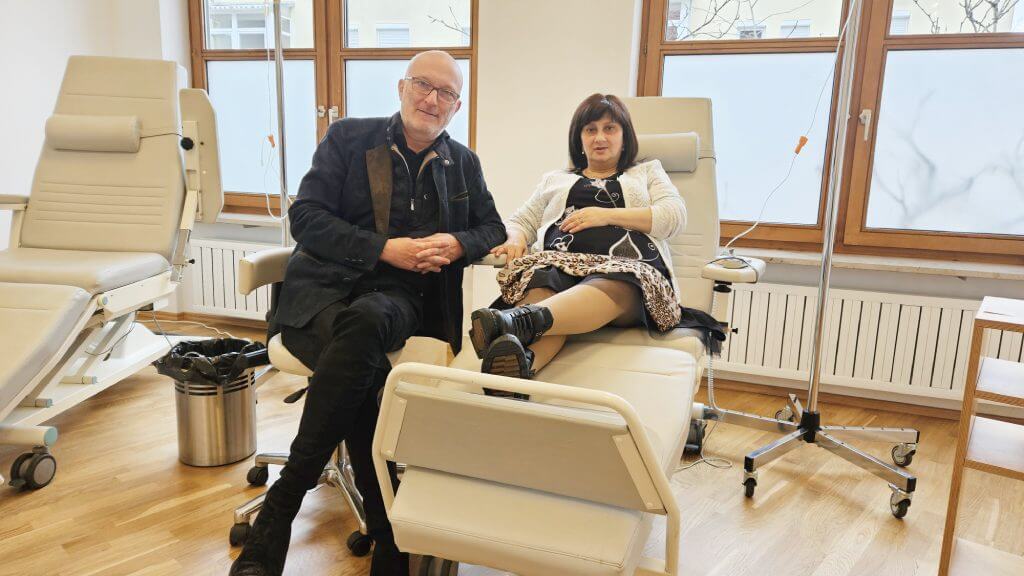
Стоимость лечения
Стоимость лечения рака яичников в Германии варьируется в зависимости от назначенного метода лечения и клиники, в которой будет проходить терапия. В немецких госпиталях предлагаются прозрачные цены и высокое качество медицинского обслуживания, при этом каждой пациентке предоставляется подробная схема лечения со сметой расходов. В приведенной ниже таблице представлены данные о традиционных и инновационных методах лечения:
| Вид терапии | Показатели 2-летней выживаемости | Показатели ответа на лечение | Продолжительность курса лечения | Побочные эффекты |
|---|---|---|---|---|
| Стандартные методы лечения | ~25% на поздних стадиях рака | Менее 10% | Несколько циклов | Тяжелые побочные эффекты (тошнота, повышенная утомляемость, выпадение волос, иммуносупрессия, раздражение кожи) |
| Инновационные методы лечения | ~60% на поздних стадиях рака | 45-65% | До 4 сеансов | Незначительные побочные эффекты (дискомфорт в месте проведения лечебной манипуляции) |
*Данные Booking Health
Пациентки, которые рассматривают возможность прохождения передового лечения рака яичников за рубежом, часто сравнивают предложения в различных странах, учитывая при этом уровень технологий, доступность инноваций и стоимость терапии. В представленной ниже таблице сравнивается стоимость лечения в Германии и других странах, которые являются популярными направлениями медицинского туризма:
Стоимость медицинских процедур для лечения рака яичников
| Метод лечения | Германия* | Великобритания | США |
|---|---|---|---|
| Стандартные методы лечения | €80 000 - €150 000 за полный курс | €90 000 - €165 000 за полный курс | €100 000 - €180 000 за полный курс |
| Инновационные методы лечения | €25 000 - €60 000 за полный курс | €70 000 - €120 000 за полный курс | €100 000 - €150 000 за полный курс |
*Цены могут варьироваться в зависимости от назначенного пациентке курса лечения и особенностей опухоли
Лечение рака яичников в Германии с Booking Health
Германия занимает ведущие позиции в области лечения рака яичников. Здесь пациенткам с этим диагнозом предлагаются передовые медицинские технологии и услуги онкологов с мировым именем, а также в этой стране регулярно достигаются высокие показатели эффективности лечения. В Германии ведут работу современные клиники, в которых имеется прогрессивное оборудование и предлагаются инновационные виды терапии, например, HIPEC и иммунотерапия дендритными клетками, которых пока нет в широком доступе в других странах. Применение в клинической практике персонализированных схем лечения способствует достижению оптимальных результатов и повышению качества жизни пациенток.
Booking Health предоставляет комплексную поддержку иностранным пациенткам, помогая им с решением любых вопросов на каждом этапе их лечения – от организации консультаций с врачами в Германии и приема в клинике до помощи с оформлением документации, визовой поддержки и предоставления услуг профессионального медицинского переводчика. С Booking Health у пациентки есть возможность полностью сосредоточиться на своем выздоровлении, в то время как сотрудники компании позаботятся о профессиональном решении всех логистических вопросов поездки на лечение в Германию.
Мы предлагаем:
- Оценку и анализ медицинских заключений пациентки
- Составление медицинской программы
- Подбор подходящего медицинского учреждения для лечения
- Подготовку медицинской документации и ее направление в выбранную пациенткой для лечения клинику
- Консультации с врачами госпиталя в Германии для разработки оптимальной медицинской программы на этапе подготовки к поездке на лечение
- Профессиональные консультации во время пребывания в больнице
- Последующее консультирование пациентки после её возвращения на родину по завершении медицинской программы
- Решение организационных вопросов в рамках подготовки к поездке на лечение в Германию
- Координацию и организацию пребывания пациентки в другой стране
- Помощь в оформлении визы и бронировании авиабилетов
- Услуги переводчика и персонального координатора, который будет с вами на связи 24/7
- Прозрачные цены на лечение без скрытых платежей
Свяжитесь со специалистами Booking Health уже сегодня, и вы получите индивидуальную консультацию, которая станет первым шагом на пути к эффективному лечению рака яичников в Германии.
Инновации в онкологии: опыт пациентов Booking Health
Частые вопросы о лечении рака яичников в Германии
Отправить запрос на лечениеВ Германии предлагается полный спектр методов лечения рака яичников, включая хирургию, химиотерапию и таргетную терапию. В специализированных клиниках также доступны такие передовые терапевтические методики, как HIPEC (гипертермическая внутрибрюшинная химиотерапия) и иммунотерапия дендритными клетками, благодаря чему пациентки могут получить здесь инновационное и высокоэффективное лечение.
Стоимость лечения рака яичников в Германии составляет €20 000 - €50 000 в зависимости от выбранного метода лечения и сложности клинического случая. В стоимость входят консультации, диагностика, хирургическая операция и последующее наблюдение.
В число лучших клиник для лечения рака яичников в Германии входят Клиника Асклепиос Бармбек, которая славится своим уникальным опытом в области гинекологической онкологии, и Онкологическая клиника LDG Laboratories, специализирующаяся на проведении инновационной терапии дендритными клетками.
Да, в Германии охотно принимают на лечение иностранных пациенток. С оператором медицинского туризма Booking Health поездка на лечение в Германию для пациентки из-за рубежа пройдет просто и максимально комфортно.
Да, процедура HIPEC проводится в ведущих отделениях гинекологической онкологии по всей Германии. Данный метод широко применяется для лечения рака яичников на поздних стадиях и демонстрирует положительные результаты в плане улучшения показателей выживаемости пациенток.
В Германии одни из самых высоких показателей успешность лечения рака яичников в Европе, особенно на ранних стадиях заболевания, когда при обеспечении пациентке своевременного и эффективного лечения пятилетняя выживаемость может достигать 90%.
Начать организацию лечения в Германии довольно просто. Для этого вам нужно лишь связаться с Booking Health – профессиональным оператором медицинского туризма. Специалисты компании помогут организовать консультацию с врачом в Германии, подготовить медицинскую документацию и решить логистические вопросы поездки на лечение в зарубежную клинику.
Выбирайте лечение за рубежом и Вы, несомненно, получите отличный результат!
Статья составлена под редакцией экспертов в области медицины, врачей-специалистов доктора Надежды Иванисовой и доктора Богдана Михальнюка. Для лечения состояний, о которых идет речь в статье, необходимо обратиться к врачу; информация в статье не предназначена для самолечения!
С редакционной политикой, которая отражает наше стремление к точности и прозрачности, можно ознакомиться здесь. Перейдите по ссылке, чтобы ознакомиться с нашими правилами.
Источники:
[1] World Cancer Research Fund. Ovarian Cancer Statistics. Published 2024. https://www.wcrf.org/preventing-cancer/cancer-statistics/ovarian-cancer-statistics/
[2] World Ovarian Cancer Coalition. Ovarian Cancer Key Stats. Published 2022. https://worldovariancancercoalition.org/about-ovarian-cancer/key-stats/
[3] Robert Koch Institut. Ovarian Cancer. Published 2020. https://www.krebsdaten.de/Krebs/EN/Content/Cancer_sites/Ovarian_cancer/ovarian_cancer_node.html
[4] ScienceDirect. Trends in the incidence and mortality of cervical, ovarian, and corpus uteri cancers in Wales, UK: A joinpoint regression analysis from 2002 to 2021. https://www.sciencedirect.com/science/article/abs/pii/S1877782124001395?via%3Dihub
[5] Ovarian Cancer Research Alliance. Ovarian Cancer. Published 2024. https://ocrahope.org/for-patients/gynecologic-cancers/ovarian-cancer/
[6] National Ovarian Cancer Coalition. Types and Stages. Published 2024. https://ovarian.org/about-ovarian-cancer/types-and-stages/
[7] American Cancer Society. What is Ovarian Cancer. Ovarian Tumors and Cysts. Published 2024. https://www.cancer.org/cancer/types/ovarian-cancer/about/what-is-ovarian-cancer.html
[8] UT Health San Antonio. Ovarian Cancer: Early Detection Can Help Save Lives. Published 2023. https://news.uthscsa.edu/ovarian-cancer-early-detection-can-help-save-lives/
[9] Sage Journals. Ovarian cancer surgery in Germany: An analysis of the nationwide hospital file 2005–2015. https://journals.sagepub.com/doi/10.1177/17455065221075903
[10] Journal of Gynecologic Oncology. Expert commentary on HORSE/MITO18 and CHIPOR. https://ejgo.org/DOIx.php?id=10.3802/jgo.2025.36.e87
[11] ScienceDirect. Statement of the AGO Kommission Ovar, AGO Study Group, NOGGO, AGO Austria, Swiss AGO, BGOG, CEEGOG, GEICO, and SFOG regarding the use of hyperthermic intraperitoneal chemotherapy (HIPEC) in epithelial ovarian cancer. https://www.sciencedirect.com/science/article/abs/pii/S000745512300098X?via%3Dihub
[12] Gynecologic Oncology. Dendritic cell-based immunotherapy (DCVAC/OvCa) combined with second-line chemotherapy in platinum-sensitive ovarian cancer (SOV02): A randomized, open-label, phase 2 trial. https://www.gynecologiconcology-online.net/article/S0090-8258(21)00533-3/fulltext
[13] International Journal of Gynecological Cancer. Survey on implementation of molecular testing in ovarian cancer and PARP inhibitor: a national North-Eastern German Society of Gynecologic Oncology/Young Academy of Gynecologic Oncology/Arbeitsgemeinschaft Gynäkologische Onkologie intergroup analysis. https://www.international-journal-of-gynecological-cancer.com/article/S1048-891X(24)00693-5/fulltext
Читайте:
Борьба с распространенным раком яичников: передовой опыт немецких онкогинекологических центров
Меню статьи:
- Что такое рак яичников?
- Почему стоит сделать выбор в пользу лечения рака яичников в Германии?
- Стандартные методы лечения в Германии
- Инновационные и передовые методы лечения
- Лучшие клиники и онкологи Германии
- Стоимость лечения
- Лечение рака яичников в Германии с Booking Health
- Частые вопросы о лечении рака яичников в Германии
Не знаете, с чего начать?
Свяжитесь с Booking Health